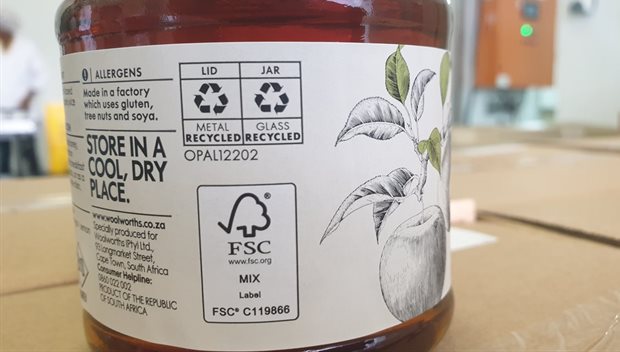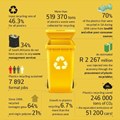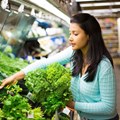Some of SA's biggest retailers, with the aid of WWF, are rolling out standardised recycling instructions, known as On Pack Recycling Labels (OPRLs), which will indicate whether the packaging can or cannot be recycled. It's hoped that clear and unambiguous labelling will help solve the scourge of plastic pollution.
The retail brands currently participating in this initiative are Clicks, Food Lovers Market, Pick n Pay, Spar, Shoprite and Woolworths. As it is rolled out, other companies are also expected to come on board.
South Africa has well developed and pragmatic food labelling regulations that present the consumer with a range of facts about what they are about to eat. However, until now, there has been little information about the packaging making it something of a headache for consumers to figure out how to manage their waste.
Features of the new OPRLs:
• Messaging which reads simply ‘Recycled’ or ‘Not Recycled’.
• To qualify as ’Recycled’, packaging must be recycled in practice and at scale in at least one major centre. This information will be reviewed regularly.
• The new information will appear on the packaging label whenever possible or in the pack design (in the case of flexible packaging).
The packaging will still include the current resin code (three chasing arrows with coded numbers and sometimes letters). These are intended for industry insiders, such as waste pickers, recyclers and sorters, however, many consumers currently mistake these to mean that packaging is recyclable which is not the case.
Not a cure-all
Lorren de Kock, project manager of the WWF circular plastics project, commented: “WWF is pleased to have been able to play a successful facilitation role, securing collective retailer agreement on the technical recycling specifications for on-pack labels.
“It’s an effort that’s been running in the industry for about eight years so concluding a transparent and widely consultative process is no small feat. We trust that it will make both the consumer and the waste-pickers’ task of understanding what is recyclable much easier. However, this is by no means enough. Increasing our understanding of the recyclability of a particular type of packaging is only step one in the behaviour change necessary to stop the flow of plastics in nature. We also need to reduce our dependence on single-use plastics.”
Alison Stowell 21 Aug 2019
Recycling rates
Although the percentage of households in South Africa that actively recycle remains low, our recycling rates for many materials (notably beverage cans) are among the best in the world. This can be attributed to an active informal sector of waste pickers. But incorrect sorting at source causes significant cost to recyclers who then have to pay the costs of disposing of these plastics.
While it is technically possible to recycle all polymer types, in reality a raft of limiting factors such as lack of infrastructure, market conditions, equipment or budgetary limitations and over-engineered materials mean that much is lost to landfill or worse into the environment.
It also means that woefully little is recycled back into food-grade packaging. So while the consumer has a role to play, improving our recycling rates requires investment from industry and different tiers of government.












































